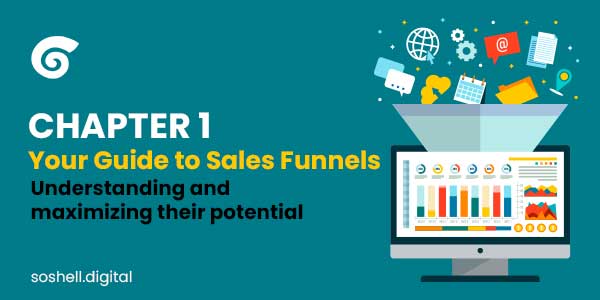In the world of business, turning potential customers into loyal patrons is a delicate dance of strategy and persuasion. At the core of this intricate process lies the concept of a “sales funnel.” Understanding what a sales funnel is and why it’s pivotal to your sales and marketing efforts is the first step towards creating a successful business model. In this article, we’ll unravel the mystery of the sales funnel and explore its significance in the modern business landscape.
What is a Sales Funnel?
A sales funnel is a conceptual framework that represents the journey a potential customer takes from their initial awareness of your product or service to becoming a paying customer. Picture it as an inverted pyramid, where the wide top represents the initial stage, and the narrow bottom signifies the final conversion into a customer. The funnel is divided into stages, each of which requires specific actions and interactions to advance the prospect towards a sale.
Let’s break down the typical stages of a sales funnel:
- Awareness: At the top of the funnel, potential customers become aware of your brand, product, or service. This stage involves creating visibility through marketing efforts such as social media, content marketing, advertising, and SEO.
- Interest: In this stage, prospects show interest by engaging with your content, signing up for newsletters, or following your social media accounts. They are not customers yet, but they are getting closer.
- Consideration: Prospects enter the consideration stage when they start researching and comparing your offerings to others. They might read reviews, watch product videos, or join webinars to gather more information.
- Conversion: This is the moment of truth. At this stage, a prospect becomes a customer by making a purchase or taking another desired action, like signing up for a subscription.
- Retention and Loyalty: The journey doesn’t end at the point of conversion. Delighting your customers post-purchase is vital for building loyalty and encouraging repeat business.
Why is the Sales Funnel Crucial?
Understanding the sales funnel is pivotal for several reasons:
- Strategic Marketing: The funnel provides a structured approach to marketing. It helps you tailor your strategies to the specific needs and behaviors of prospects at each stage.
- Efficient Resource Allocation: By knowing where prospects are in the funnel, you can allocate your resources effectively. For example, you may invest more in awareness-building at the top or focus on personalized communication for conversions.
- Improving Conversions: By identifying bottlenecks or drop-offs at different stages of the funnel, you can make targeted improvements to increase conversion rates.
- Customer Insights: The funnel offers valuable insights into customer behavior. It helps you understand why people drop off at certain points and what you can do to keep them moving through the funnel.
- Measurable Results: A well-defined sales funnel allows you to measure the success of your marketing efforts more accurately. You can track key performance indicators (KPIs) at each stage and adjust your strategy accordingly.
- Customer Retention: Beyond initial conversions, the sales funnel helps you retain customers by guiding them through the post-purchase journey. Happy customers are more likely to become loyal advocates for your brand.
Conclusion
In conclusion, the sales funnel is a fundamental concept that underpins successful sales and marketing efforts. It provides a roadmap for attracting, nurturing, and converting prospects into loyal customers. By understanding the stages of the funnel and the importance of each, businesses can refine their strategies, optimize their resources, and ultimately drive growth and success in a competitive marketplace. So, if you’re looking to take your sales and marketing efforts to the next level, start by mastering the art of the sales funnel.

